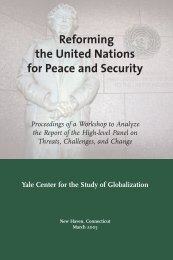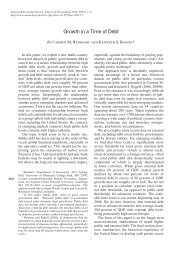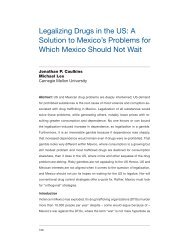The collapse of global trade, murky protectionism, and the crisis:
The collapse of global trade, murky protectionism, and the crisis:
The collapse of global trade, murky protectionism, and the crisis:
Create successful ePaper yourself
Turn your PDF publications into a flip-book with our unique Google optimized e-Paper software.
<strong>The</strong> <strong>collapse</strong> <strong>of</strong> <strong>global</strong> <strong>trade</strong>, <strong>murky</strong> <strong>protectionism</strong>, <strong>and</strong> <strong>the</strong> <strong>crisis</strong><br />
<strong>The</strong> climate change negotiations probably represent <strong>the</strong> widest-ranging negotiation<br />
on such matters. Still, significant advances were accomplished in <strong>the</strong> <strong>trade</strong>-<strong>and</strong>environment<br />
nexus with <strong>the</strong> negotiation <strong>of</strong> various provisions <strong>of</strong> <strong>the</strong> WTO, GATT,<br />
GATS, <strong>the</strong> Agreement on Technical Barriers to Trade (TBT), <strong>and</strong> <strong>the</strong> Agreement on<br />
Sanitary <strong>and</strong> Phytosanitary Measures (SPS) that governments can take. <strong>The</strong>se accords,<br />
reinforced by many similar provisions in regional <strong>trade</strong> agreements, disavow discriminatory<br />
intent in <strong>the</strong> implementation <strong>of</strong> environmental measures that have<br />
implications for international commerce. <strong>The</strong> TBT <strong>and</strong> SPS accords also require scientific<br />
evidence to be applied in determining technical, health, <strong>and</strong> safety st<strong>and</strong>ards.<br />
None <strong>of</strong> this is to imply that <strong>the</strong>se matters are settled <strong>and</strong> have not proved to be controversial;<br />
to <strong>the</strong> contrary some very bitter international disputes have been taken to<br />
<strong>the</strong> WTO for adjudication. Even so, <strong>the</strong> principles <strong>of</strong> sound environmental policymaking<br />
that are "least distorting" <strong>of</strong> international commerce have been established,<br />
<strong>and</strong> are particularly relevant when policymakers come under intense protectionist<br />
pressure.<br />
<strong>The</strong> <strong>global</strong> economic <strong>crisis</strong> <strong>and</strong> green <strong>protectionism</strong><br />
If <strong>the</strong> working definition <strong>of</strong> green <strong>protectionism</strong> is "<strong>the</strong> deliberate use <strong>of</strong> environmental<br />
policy initiatives to discriminate against foreign commercial interests, including<br />
subsidiaries <strong>of</strong> companies owned or headquartered abroad," <strong>the</strong>n <strong>the</strong>re have been<br />
some very worrying developments in recent months.<br />
<strong>The</strong>se worries do not relate to environmental policymaking per se, ra<strong>the</strong>r to cases<br />
where <strong>the</strong> measures chosen <strong>and</strong> implemented to advance government environmental<br />
goals have in fact been influenced by <strong>the</strong> desire to shield domestic firms <strong>and</strong> workers<br />
from different types <strong>of</strong> foreign competition. For sure, not every example <strong>of</strong> green<br />
<strong>protectionism</strong> is stated explicitly (although an example follows below.) Green <strong>protectionism</strong><br />
<strong>of</strong>ten involves <strong>the</strong> abuse <strong>of</strong> <strong>the</strong> discretion required to make sound environmental<br />
policy choices. As such, some green <strong>protectionism</strong> is an example <strong>of</strong> <strong>the</strong><br />
<strong>murky</strong> <strong>protectionism</strong> that this book has sought to highlight <strong>the</strong> danger <strong>of</strong> during <strong>the</strong><br />
current <strong>global</strong> economic downturn.<br />
Environmental provisions in national stimulus packages<br />
In order to <strong>of</strong>fset falling private sector dem<strong>and</strong>, many governments have announced<br />
<strong>and</strong> begun implementing substantial fiscal stimuli. Moreover, considerable emphasis<br />
has been placed on "green" spending or ra<strong>the</strong>r public expenditures that promote<br />
national environmental policy goals. While <strong>the</strong>re is nothing wrong in principle with<br />
<strong>the</strong> latter, it does not necessarily imply that all green spending in recent stimulus<br />
packages treats imports <strong>and</strong> domestically-produced goods on an equal footing. <strong>The</strong><br />
following example, quoted verbatim from <strong>the</strong> recently enacted US stimulus legislation,<br />
bans foreign firms from benefiting from a multi-billion dollar appropriation for<br />
high efficiency batteries:<br />
"[Provided fur<strong>the</strong>r] [t]hat $2,000,000,000 shall be available for grants for <strong>the</strong><br />
manufacturing <strong>of</strong> advanced batteries <strong>and</strong> components <strong>and</strong> <strong>the</strong> Secretary shall<br />
provide facility funding awards under this section to manufacturers <strong>of</strong> advanced<br />
battery systems <strong>and</strong> vehicle batteries that are produced in <strong>the</strong> United States,<br />
including advanced lithium ion batteries, hybrid electrical systems, component<br />
manufacturers, <strong>and</strong> s<strong>of</strong>tware designers. "<br />
Government procurement is one <strong>of</strong> <strong>the</strong> least liberalised areas <strong>of</strong> international <strong>trade</strong>;<br />
even when overt import bans are not included in national legislation, much envi-<br />
95





